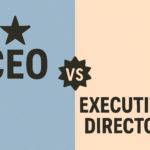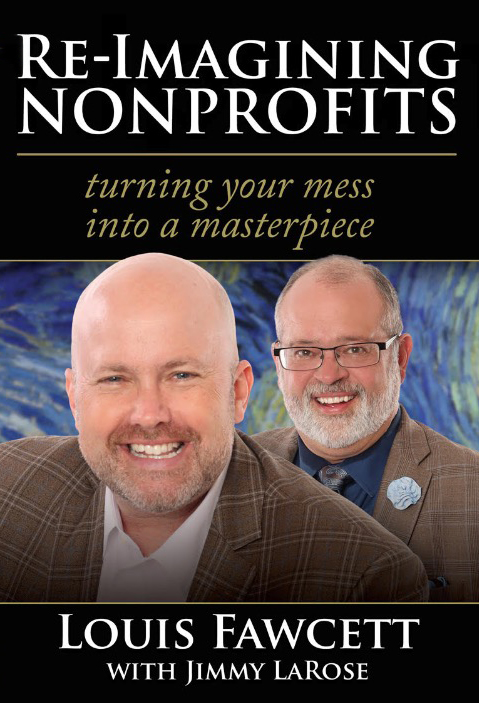
Executive Director vs CEO – How to Ask Your Board to Change Your Title!
April 16, 2025
[PODCAST] Web Presence with Purpose: Making Your Digital Footprint Count for Donors – Jay Owen
April 18, 2025Fundraising is Sales – 8 Keys That Will Supercharge Your Success

Fundraising often gets framed as something separate from the business world — a noble, selfless act disconnected from profit-driven motives. But here’s a truth every nonprofit leader needs to hear: fundraising is sales. You’re selling your mission, your impact, and the opportunity for donors to be part of something meaningful. The sooner nonprofits embrace this mindset, the more effective their fundraising will become.
Let’s explore eight key principles that treat nonprofit fundraising like the disciplined, strategic sales process it truly is — complete with the right questions, structure, and follow-through. If you embrace these, you will raise more money than you ever have before – guaranteed!
1. This is Sales (Stop Fooling Yourself)
It’s time to stop avoiding the word “sales.” Fundraising is about building relationships, discovering needs, presenting value, and asking for commitments. The difference is that your product isn’t a gadget — it’s impact. When fundraisers understand and embrace this, they can apply proven, principled sales strategies while staying mission-focused.
If you’re leading fundraising conversations, start with intentionality. The smartest sales teams succeed because they’re goal-driven, data-informed, and customer-centered. Fundraisers should do the same — because in this case, the “customers” are your donors.
Please consider:
· Sales is an exchange of value – people pay for goods and services. In the nonprofit sector, people pay for you to change and saves lives. The ROI is how broadly and deeply you can change the population you serve.
· Sales is the process of helping a person make a decision that is in their best interests. When a philanthropist wants to invest in an effective mission, it’s in their best interests to invest in your nonprofit because you will steward their gift correctly.
· Think of yourself as a Philanthropic Advisor. In the same way a wealth manager helps you invest to prepare for retirement, a Philanthropic Advisor helps donors make decisions about where to give for the greatest impact. Your role is to guide donors to invest in the programs about which they are most passionate.
Do you want to learn this process in detail? Join me for an in-person Major Gifts Ramp Up event in one of these cities: Cincinnati, Columbia, SC, San Antonio, Chicago, Dallas, Roanoke, Tupelo, Macon, or Baltimore. And if you email me at [email protected], I’ll give you a FULL scholarship! VISIT HERE TO GET STARTED
2. You Must Have a Concise Case for Support
Would a salesperson go to market without knowing what they’re selling? Of course not — and neither should you. Every nonprofit needs a concise, compelling Case for Support. This is your mission’s story — why your work matters, what problem you solve, and the difference your donors can make.
Here’s a great opening move: “May I have your permission to review our Case for Support?”
This question builds rapport, sets a respectful tone, and invites the prospect into the conversation. Your Case for Support should be short, inspiring, fact-based, and emotionally resonant. It’s your pitch — make it count.
Do you want to learn how to build a proper Case for Support? Join me for an in-person Major Gifts Ramp Up event in one of these cities: Cincinnati, Columbia, SC, San Antonio, Chicago, Dallas, Roanoke, Tupelo, Macon, or Baltimore. And if you email me at [email protected], I’ll give you a FULL scholarship! VISIT HERE TO GET STARTED
3. Find Millionaires Using DonorScope
In business, good sales teams identify high-value prospects and focus their efforts strategically. Nonprofits should too. DonorScope helps you wealth scree your existing donors AND enables you to find the contact information for every millionaire in your mission footprint.
Focusing your time on those donors with the greatest capacity is the smart strategy. Supplement your personal networks with data-driven insights. Pair this with thoughtful, personal engagement and you will raise millions.
Do you want to learn about DonorScope? Join me for an in-person Major Gifts Ramp Up event in one of these cities: Cincinnati, Columbia, SC, San Antonio, Chicago, Dallas, Roanoke, Tupelo, Macon, or Baltimore. And if you email me at [email protected], I’ll give you a FULL scholarship! VISIT HERE TO GET STARTED
4. Properly Deploy a Non-Fundraising Awareness Event
Think of this like a sales “discovery event” — a low-pressure, high-value opportunity for potential donors to learn about your work. These events aren’t about asking for money. They’re about storytelling, demonstrating impact, and fostering emotional connections.
The Awareness Event opens the door to a meaningful conversation and reveals what aspects of your mission resonate with your guests. Their answers will shape future, personalized outreach and unlock major gifts.
Do you want to learn how to deploy a Nonfundraising Awareness Event? Join me for an in-person Major Gifts Ramp Up event in one of these cities: Cincinnati, Columbia, SC, San Antonio, Chicago, Dallas, Roanoke, Tupelo, Macon, or Baltimore. And if you email me at [email protected], I’ll give you a FULL scholarship! VISIT HERE TO GET STARTED
5. You Need an Organized Sales Process with Metrics
Sales teams don’t succeed by chance. They track leads, meetings, proposals, and deals closed — and fundraisers should do the same. Set clear metrics for daily calls made, weekly meetings with major donors, solicitations, and dollars raised.
Structure drives success. Fundraising leaders should set expectations, review data regularly, and refine strategies based on what the numbers reveal.
Do you want to learn how to track metrics for your Development Team? Join me for an in-person Major Gifts Ramp Up event in one of these cities: Cincinnati, Columbia, SC, San Antonio, Chicago, Dallas, Roanoke, Tupelo, Macon, or Baltimore. And if you email me at [email protected], I’ll give you a FULL scholarship! VISIT HERE TO GET STARTED
6. Ask Questions and Listen (Use the Magic Questions)
The best salespeople listen more than they speak — and so should fundraisers. Your job isn’t to talk donors into giving, it’s to uncover their passions and align them with your mission.
Use these Magic Questions:
• “May I have your permission to speak with you about several opportunities?”
• “Is it OK with you if I reviewed the Gift Range Chart?”
• “Could I have your permission to ask you to invest in this campaign?”
• “Would you consider a gift of $XXX,XXX over X years?”
• “Can you mentor me through the best next steps?”
• “When can we talk/meet again?”
Each question invites participation, deepens trust, and positions the donor as a valued partner. This moves conversations beyond transactional asks into meaningful relationships.
Do you want to learn how to effectively ask the Magic Questions? Join me for an in-person Major Gifts Ramp Up event in one of these cities: Cincinnati, Columbia, SC, San Antonio, Chicago, Dallas, Roanoke, Tupelo, Macon, or Baltimore. And if you email me at [email protected], I’ll give you a FULL scholarship! VISIT HERE TO GET STARTED
7. Ask for a Specific Amount with Associated Impact
Vague asks don’t close deals. In both sales and fundraising, specificity builds confidence. Tie every ask to a tangible, measurable outcome. Instead of saying, “Would you support our organization?” say:
“Would you consider a gift of $50,000 over two years to fund scholarships for 200 students learning to read?”
When donors see the clear impact of their investment, they’re far more likely to give generously. Precision demonstrates preparation, professionalism, and genuine respect for their generosity.
Do you want to learn how to ask for a specific amount? Join me for an in-person Major Gifts Ramp Up event in one of these cities: Cincinnati, Columbia, SC, San Antonio, Chicago, Dallas, Roanoke, Tupelo, Macon, or Baltimore. And if you email me at [email protected], I’ll give you a FULL scholarship! VISIT HERE TO GET STARTED
8. Determine a Follow-Up Plan
In sales, fortunes are made in the follow-up. The same goes for fundraising. Don’t leave next steps vague — make them clear and intentional. After each meeting, ask:
“When can we talk/meet again?”
Agree on a specific time and topic for your next conversation. Make notes on each conversation and follow through, every time. Consistent, thoughtful follow-up keeps relationships warm, demonstrates reliability, and moves donors steadily through the decision-making process.
Do you want to learn the best follow up strategies? Join me for an in-person Major Gifts Ramp Up event in one of these cities: Cincinnati, Columbia, SC, San Antonio, Chicago, Dallas, Roanoke, Tupelo, Macon, or Baltimore. And if you email me at [email protected], I’ll give you a FULL scholarship! VISIT HERE TO GET STARTED
Final Thoughts
Nonprofits are businesses. The sooner you embrace this concept, the sooner you will be successful. Fundraising isn’t a necessary evil — it’s mission-driven sales and it’s an essential part of effectively leading your organization. No longer should we be afraid to learn from profitable businesses. Rather, the way to change and save more lives is to learn sales techniques that dramatically increase your nonprofit’s revenue. If you really care about the people you serve, you’ll make this transition.
Do you want to learn how to run your nonprofit like a business? Join me for an in-person Major Gifts Ramp Up event in one of these cities: Cincinnati, Columbia, SC, San Antonio, Chicago, Dallas, Roanoke, Tupelo, Macon, or Baltimore. And if you email me at [email protected], I’ll give you a FULL scholarship! VISIT HERE TO GET STARTED
 Fundraising is Sales – 8 Keys That Will Supercharge Your Success was first posted at INSIDE CHARITY
Fundraising is Sales – 8 Keys That Will Supercharge Your Success was first posted at INSIDE CHARITY
For more articles like Fundraising is Sales – 8 Keys That Will Supercharge Your Success VISIT HERE
For more information on RE-IMAGINING NONPROFITS – TURN YOUR MESS INTO A MASTERPIECE by Louis Fawcett’s book VISIT HERE
